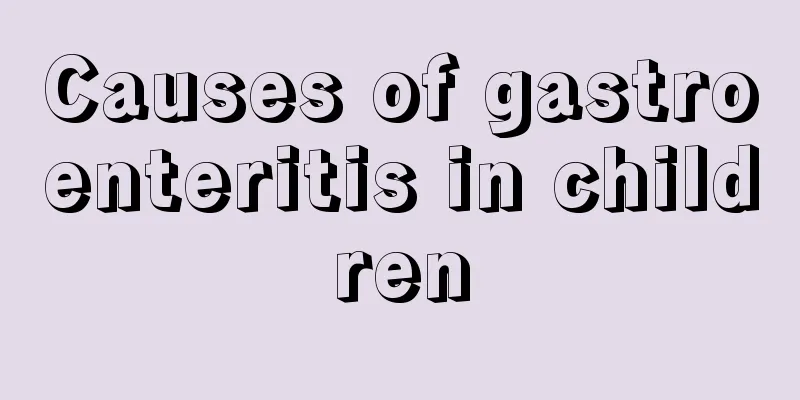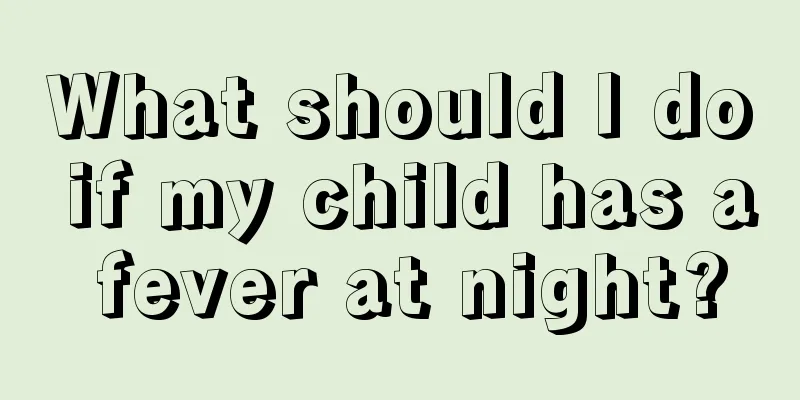Causes of gastroenteritis in children

|
We know that children's organs are not fully developed, so their resistance and immunity are certainly not as good as adults. Children are prone to various diseases, so parents must assist children in daily care to protect them from diseases. For example, children are prone to gastroenteritis, so we must understand the causes of gastroenteritis in children and provide targeted treatment. ① Intestinal infections are caused by bacteria and viruses, especially pathogenic Escherichia coli, which is the main pathogenic bacteria. If a child is sick and antibiotics are used in large quantities and irrationally, it may cause fungi to invade the gastrointestinal tract. ② Diseases other than the gastrointestinal tract, such as inflammation of the upper respiratory tract, pneumonia, nephritis, otitis media, etc., can reduce the secretion of digestive enzymes and increase intestinal motility due to fever and absorption of bacterial toxins. ③Improper feeding of infants and young children, letting them eat too much or too little; or eating too much starch or fatty foods too early; sudden changes in food, sudden weaning, etc., can all cause diarrhea in children. ④ Climate changes, such as excessive cold increasing intestinal motility and excessive heat reducing the secretion of gastric acid and digestive enzymes, can also induce acute gastroenteritis. Clinical manifestations: If acute gastroenteritis causes mild diarrhea, the patient is generally in good condition, with less than 10 bowel movements a day, which are yellow or yellow-green in color, with a small amount of mucus or white soap blocks, and not much feces. Sometimes the stool is "egg drop soup-like". Professor Chen Chunlian said that acute gastroenteritis can also cause severe diarrhea, with bowel movements ranging from several to dozens of times a day. Large amounts of watery stools, small amounts of mucus, nausea and vomiting, loss of appetite, and sometimes vomiting of coffee-like substances. If hypokalemia occurs, there may be abdominal distension and symptoms of systemic poisoning; such as irregular low or high fever, irritability and subsequent lack of energy, confusion, and even coma. In the above article, we introduced the reasons why children are prone to diseases. Children's resistance and immunity are not as strong as adults, so we parents must help children prevent diseases. The above article details the reasons why children suffer from gastroenteritis. |
<<: Causes of hypoglycemia in children
>>: What are the types of anemia in children?
Recommend
Does childhood tooth decay need treatment?
For families with young children, parents should ...
How to treat a child's daytime cough
We all know that changes in air temperature can c...
What should I do if my child keeps coughing and has phlegm?
There are many reasons why children always cough,...
Neonatal suction negative pressure
Although many mothers are particularly attentive ...
The child suddenly felt cold and shivered in the middle of the night
Children's physical fitness is in a state of ...
Treatment of swollen tonsils in three-year-old babies
The problem of enlarged tonsils in three-year-old...
Is it good for newborns to eat DHA?
DHA is also called brain gold. It has a very good...
How much milk does an eight-month-old baby drink?
During the baby's physical growth process, th...
How to cure baby’s mouth ulcers quickly?
Parents are very concerned about their baby's...
Nursing after acute rash in children
When a child is diagnosed with a terminal illness...
Why does the fetus always hiccup?
Everyone knows that the baby moves when it is in ...
Why does my six-month-old baby have itchy ears?
When babies are just born, their body resistance ...
What should I do if my child has a stuffy and runny nose?
If you have a stuffy nose and a runny nose, of co...
Do caries in deciduous teeth need to be filled?
Some parents often have this perception that thei...
Children's orthodontics, choose these three stages best
The beauty of children's teeth is related to ...









